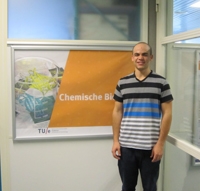
University:
Major:
Site Abroad:
Mentor(s):
Faculty Sponsor(s):
Project Title:
Project Description:
Developing suitable replacements for organs containing an efficient, functional and bioactive membrane is an essential aspect of the regenerative medicine research being conducted. A bioartificial kidney device adjunct to the dialysis machine would ameliorate dialysis. This device should contain a free-standing synthetic membrane with epithelial cells at the pre-urine and endothelial cells at the blood side. Here, a supramolecular membrane for endothelial cell stimulation was developed using ureido-pyrimidinone (UPy) modified polymers and peptides. The self-complementary ability of UPy with customizable UPy-modified peptide chains attached to a UPy-polymer via hydrogen bonding interactions would create a dynamic membrane that could emulate the extracellular membrane and be tailored to molecules that aid in endothelial cell adhesion and proliferation. The negatively charged biomolecule heparin is a good candidate to induce adhesion and proliferation because of its ability to bind growth factors. Heparin is a known anticoagulant and this along with its ability to signal endothelial cell growth is an essential aspect of the bloods interaction with cells. Two supramolecular bioactive UPy-modified biomaterials with different linkers were designed and synthesized with the known positively charged heparin binding sequence of amino acids XBBBXXBX (X being a hydrophobic amino acid and B being a basic amino acid). The peptide was shown to be stably incorporated in the material by testing its release in water. Subsequently, visualization with fluorescent heparin indicated peptide surface retention and its capability to bind heparin. Further experiments aim at the investigation of endothelial cell behavior on these novel membranes.
